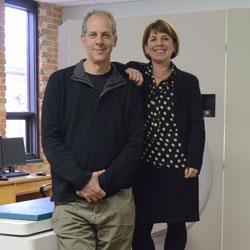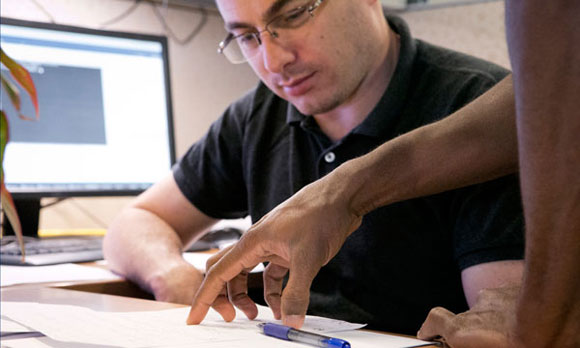
Duke University has received $9.75 million in gifts and matching funds to support an initiative that focuses on harnessing massive amounts of information to tackle society’s biggest challenges, President Richard H. Brodhead said Monday.
Launched in 2013, the Information Initiative at Duke (iiD) brings together diverse faculty and graduate and undergraduate students to make sense of "Big Data" -- information characterized by tremendous volume, variety and rapid change. The goal is to address a wide range of issues -- from the identification of counterfeit art to the early detection of disease.
The iiD is the cornerstone of the Information, Society and Culture theme of Bass Connections, another Duke initiative that encourages student and faculty collaboration across traditional academic boundaries on issues of global importance.
“The iiD has provided invaluable opportunities for our faculty and students to translate vast amounts of data into major breakthroughs,” Brodhead said. “This infusion of funds will allow us to continue to advance our understanding of how to convert data into knowledge for human benefit, as well as train students in these critical skills.”
The gifts will endow iiD professorships, graduate fellowships in engineering, and educational programs on data-driven problem-solving, both in the classroom and in the field. It also will provide flexible funding for iiD to explore new teaching and research avenues.
“The availability of massive amounts of data within every disciplinary domain is transforming research and education,” said Robert Calderbank, iiD director and a professor in Duke’s departments of electrical and computer engineering, computer science and mathematics. “With this generous support, Duke and iiD will continue to lead the way in developing truly innovative opportunities for our students and faculty to engage with big data and impact society in the classroom and beyond.”

Yan Kaganovsky, a postdoc in electrical and computer engineering, reviews data in an iiD project. Ikenna Odinaka, also an ECE postdoc, assists him. Photo by Les Todd/Duke Photography
In the past two years, iiD teams of Duke faculty and students have analyzed and interpreted unending torrents of data captured by computers, cameras, sensors and smart phones. Projects so far have included collaborations with Duke Medicine to deploy personalized health care; with the Duke University Energy Initiative to understand energy usage and improve efficiency; and with Duke’s Social Science Research Institute to inform better public policies. Teams are also tackling the National Academy of Engineering’s Grand Challenges for Engineering, such as reverse-engineering the brain to uncover its vast, unrealized potential and to improve detection and treatment of brain-related diseases.
In one Bass Connections project, iiD faculty and students are working together to facilitate screening for autism and childhood mental disorders. By designing algorithms to automatically detect abnormal movements or behaviors captured on video, the team hopes to provide valuable tools to help clinicians detect symptoms and intervene earlier.
“If we can find patterns in the data that point to just a few simple tests or questions that truly indicate a problem, that would be a tremendous tool for clinicians,” said Guillermo Sapiro, a professor in engineering and computer science who co-leads the project with Duke child psychiatrist Dr. Helen Egger. “It’s an exciting project because the contribution to society could be huge.”
The iiD also provides learning experiences for students that equip them to live and work in a data-driven world. They include “Data Expeditions,” in which graduate students lead undergraduates in analyzing messy data sets, from baseball scores to art market records from 18th-century Paris. In Data+ summer projects, students develop and use statistical and mathematical methods to interpret data sets. This year, one group will examine Durham housing trends.
The $9.75 million includes two gifts totaling $6.67 million from an anonymous donor that is matched by challenge funds from philanthropists Anne T. and Robert M. Bass. Duke launched Bass Connections in 2013 with a $50 million gift from the Basses, including $25 million in challenge money.
Bass Connections is a priority of Duke Forward, the seven-year, university-wide fundraising campaign that aims to raise $3.25 billion by June 30, 2017. Every dollar donated to Duke's 10 schools and units, Duke Medicine or university programs and initiatives counts toward the campaign.
For more information about the iiD, click here.